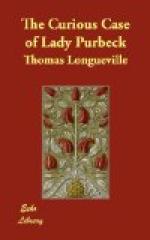To these terrible accusations Lady Elizabeth unblushingly replied: “1. I had cause to provide for her quiet, Secretary Winwood threatening she should be married from me in spite of my teeth, and Sir Edward Coke intending to bestow her against her liking: whereupon she asked me for help, I placed her at my cousin-german’s house a few days for her health and quiet. 2. My daughter tempted by her father’s threats and ill usuage, and pressing me to find a remedy, I did compassionate her condition, and bethought myself of this contract with my Lord of Oxford, if so she liked, and therefore I gave it to her to peruse and consider by herself: she liked it, cheerfully writ it out with her own hand, subscribed it, and returned it to me. 3. The end justifies—at least excuses—the fact: for it was only to hold up my daughter’s mind to her own choice that she might with the more constancy endure her imprisonment—having this only antidote to resist the poison—no person or speech being admitted to her but such as spoke Sir John Villiers’ language. 4. Be it that I had some tall fellows assembled to such an end, and that something was intended, who intended this?—the mother! And wherefore? Because she was unnaturally and barbarously secluded from her daughter, and her daughter forced against her will, contrary to her vows and liking, to the will of him she disliked.”
She then goes on to describe, by way of recrimination, Sir Edward Coke’s “most notorious riot, committed at my Lord of Argyle’s house, where, without constable or warrant, well weaponed, he took down the doors of the gatehouse and of the house itself, and tore the daughter in that barbarous manner from her mother—justifying it for good law: a word for the encouragement of all notorious and rebellious malefactors from him who had been a Chief Justice, and reputed the oracle of the law.”
A State Paper (Dom., James I., 19th July, 1617, John Chamberlain to Sir Dudley Carleton) tells us what followed. As correspondence with Sir Dudley Carleton will be largely quoted in these pages, this opportunity may be taken of observing that he was Ambassador, at various times, in Savoy, in the Low Countries, and in Venice, that he became one of Charles the First’s principal Ministers of State, and that he was eventually created Viscount Dorchester.
“The next day being all convened before the Council, she” [Frances the daughter] “was sequestered to Mr. Attorney, & yesterday, upon a palliated agreement twixt Sir Edward Coke & his lady, she was sent to Hatton House, with order that the Lady Compton should have access to win her & wear her.” One wonders whether the last “&” was accidentally substituted for the word “or,” by a slip of the pen. In any case to “wear her” is highly significant!




